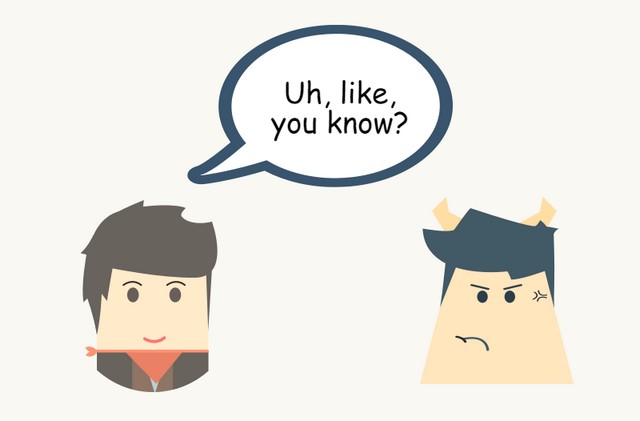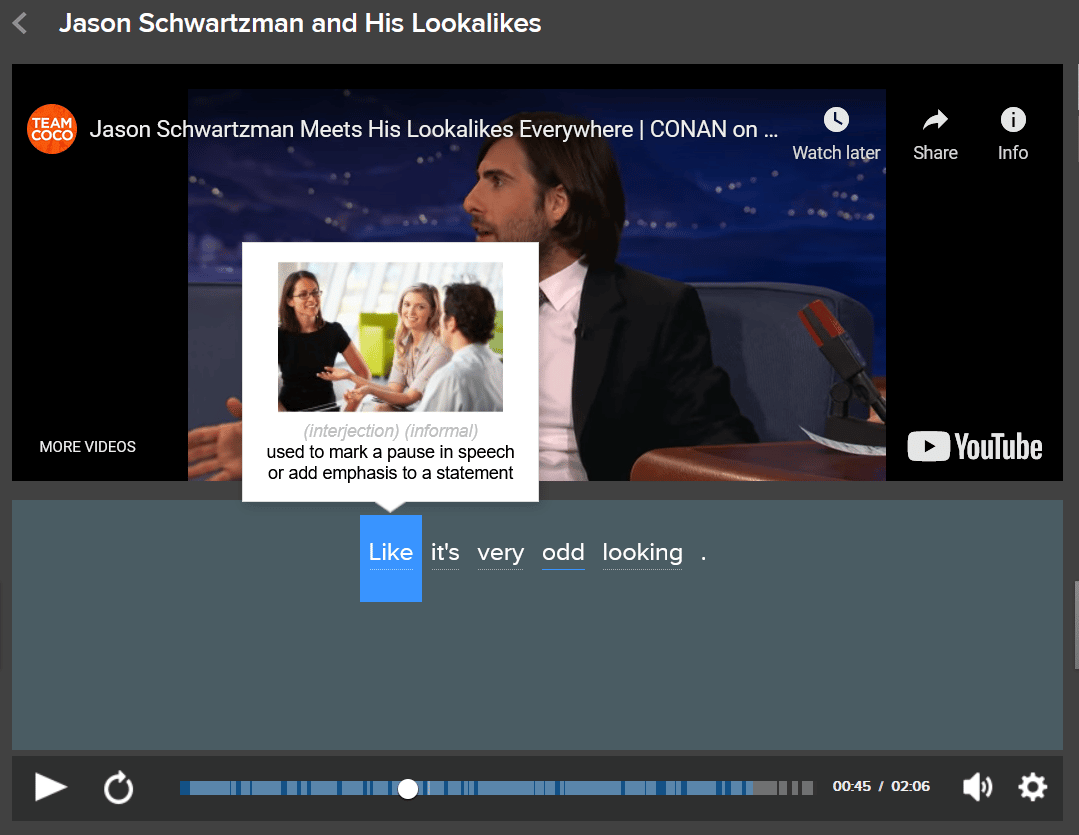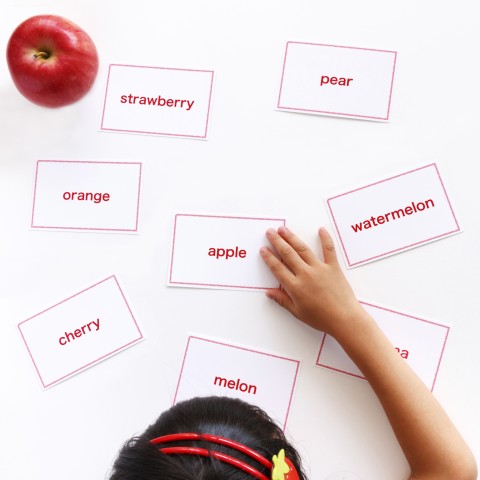В английском языке есть слова для заполнения пауз в речи, их называют filler words. Этот термин на руский язык переводят как слова-филлеры, слова-заполнители или слова-паразиты. В этой статье мы рассмотрим некоторые такие слова и их функции.
Содержание:
- Что такое слова-паразиты?
- Для чего используются Filler Words в английском языке.
- Зачем нужно знать английские слова-паразиты.
- Список основных Filler Words.
- Какие из этих слов могут засорить вашу речь?
Что такое слова-паразиты?
Слова-паразиты — явление универсальное, присущее любому языку, поэтому рассмотрим их для удобства на примере русского языка.
В устной речи часто возникают паузы (так называемые «хезитационные паузы», то есть паузы колебания), когда говорящий приостанавливает или замедляет речь, подбирая слова. Паузы могут заполняться по-разному:
- эканьем (э-э),
- растягиванием гласных (мне мороженого, я вот буду-у-у… арбузное),
- задумчивым повторением слов (я хотел тебе сказать… хотел сказать…),
- покашливанием,
- просто молчанием,
- но чаще всего их заполняют словечки вроде «как бы», «это самое», «короче».
Последние мы называем словами-паразитами, ведь когда речь испещрена этими словами, они засоряют ее, делая некрасивой и трудной для восприятия. С другой стороны, при разумном использовании эти слова разбивают поток речи на отрезки, помогают избегать молчаливых пауз, дают понять собеседнику, что вы подбираете слова, словом — помогают лучшему взаимопониманию.
В английском языке с помощью слов-паразитов можно:
- Показать, что вы думаете:
We need… well… ten gallons of gas. — Нам нужно… мм… десять галлонов бензина.
- Смягчить высказывание. Если вы обедаете с коллегами и у одного из них застрял кусочек зелени в зубах, можно сказать просто «You have something in your teeth» (у вас что-то в зубах). Но все же мягче будет звучать:
Well, you have, um, you have a little something in your teeth. — Эмм… у вас, ээ, что-то там мелкое в зубах».
- Придать оттенок выражению. Представим ситуацию: Том должен Джерри 20 долларов, но почему-то говорит, что должен 10.
Tom: I know I owe you ten dollars. — Я знаю, что должен тебе десять долларов.
Рассмотрим два варианта ответа:
Ответ 1: Jerry: Actually, you owe me twenty. — Вообще-то, ты должен мне двадцать.
Здесь actually демонстрирует возражение, довольно резкое.
Ответ 2: Jerry: Well… you see… actually, you owe me twenty. — Ну… видишь ли… вообще-то, ты должен мне двадцать.
Слова well, you see заполнили паузу в речи Джерри, когда он не был уверен, как отреагировать на такое заявление, и при этом смягчили возражение, сделав его не резким, а деликатным.
- Тянуть время. Когда человеку задают неловкий вопрос, в его красивую речь сразу вклиниваются мелкие паразиты.
Teacher: Where’s your homework? — Где твоя домашняя работа?
Student: Uhh. Umm. Well, you see.. My dog ate it. — Нуу, ээ. Это самое… в общем… собака съела.
- Вовлечь собеседника в диалог:
It was a really big bear, you know? — Реально здоровый медведь был, да?
Здесь «you know?» (ты знаешь? так ведь? да?) — это приглашение отреагировать на высказывание.
Зачем нужно знать английские слова-паразиты
- Ими пользуются все: подростки, преподаватели, политики, юристы. Не зная слова, заполняющие паузы, вы можете не понять или недопонять смысл речи собеседника. Иногда пауза в речи или пауза, заполненная словами-паразитами, куда выразительнее, чем сами слова.
- Их невозможно избежать. Слова-паразиты — это не порок, а естественная часть языка, как, к примеру, интонация, паузы. Людям не свойственно говорить сплошным механическим потомком, паузы и их заполнители — неотъемлемая часть речи, поэтому лучше знать иностранные слова-паразиты, чем вставлять в английскую речь русские «это самое» и «нуу».
- Они помогают говорить бегло и без пауз. Важная функция слов-паразитов заключается в том, что пока вы их произносите, есть время подобрать слова. При этом собеседнику они подсказывают, в каком примерно русле пойдет речь. Например: I’m looking for… what do you call it… fire extinguisher! — Я ищу… как его там… огнетушитель! Выражение what do you call it (как оно там называется, как его), заполнившее паузу, с одной стороны «склеило» речь, помогая избежать молчания, а с другой подсказало собеседнику, что говорящий припоминает название предмета.
- Ваша речь станет выразительнее и живее. Многие слова-филлеры придают высказываниям оттенки, которые можно всячески варьировать и сочетать. «Well, I don’t think so (ну, я так не думаю)» — это не то же самое, что «I don’t think so».
Список основных Filler Words
Некоторые из слов, приведенных ниже, имеют прямое значение, не связанное с необходимостью заполнения пауз. К примеру, слово well может значить «хорошо», «отлично»:
This cake looks well! — Этот пирог выглядит отлично!
А может использоваться как слово, заполняющее паузу для обдумывания ответа, наподобие нашего «ну»:
I can offer you… well… two hundred dollars. — Я могу предложить вам… ну… двести долларов.
Эта разница интересно обыграна в сериале «Community». Ширли использует слов-паразиты, а Пирс поправляет ее.
— Okay. These brownies are, uh — Так вот, эти пирожные, они, ээ…
— Uh! — Ээ!
— They, um — Они… нуу…
— Um! — Ну!
— These brownies are delicious. They taste like — Эти пирожные вкусные, на вкус вроде…
— Like! — Вроде!
— That’s not a filler word! — Это не слово-паразит!
В этой сценке подразумевается, что у слова like есть обычное значение «как» (сравнительный союз) и «паразитическое» — «вроде», «как бы». Ниже все слова разъясняются именно в тех значениях, которое они имеют, когда используются для заполнения пауз.
1. Well — ну, что ж, итак
Возможно, самое популярное слово для заполнения пауз. С помощью well заполняют как вынужденные паузы (нужно подумать), так и тактические (нужно произвести какой-то эффект). Например, с помощью well можно:
- Взять паузу на обдумывание ответа:
— Sir, is that your gun in the car? — Сэр, это ваш пистолет в машине?
— Well… No, I guess someone else left it there. — Ну… Нет, я думаю, кто-то другой его там оставил.
- Показать собеседнику, что вы обдумываете ответ, даже если это не так:
Well… okay, I’ll sell my bike for 20 dollars. But just because we are neighbours. — Ну… хорошо. Я продам велик за 20 долларов. Но только потому, что мы соседи.
- Сделать паузу в целях выразительности:
— Good work! — Хорошая работа!
— Well, it was easy. — Ну, это было просто.
- Прервать неловкую паузу в разговоре.
— Well! Let’s open the champagne! — Что ж! Давайте откроем шампанское!
2. Like — вроде, как бы, где-то
Like — это слово-паразит, которым часто злоупотребляют подростки, оно используется, когда есть неуверенность в чем-то, аналогично нашим вроде, как бы, где-то.
— That lady has like ten cats. — У этой дамочки где-то кошек десять.
Неуверенность — это не обязательно незнание точного количества, как в примере выше. Слово like может проскакивать часто просто потому, что говорящий думает, что сказать дальше.
— He was like, about the same age as me, but like, I wasn’t sure what he, like, wanted from me. — Он был вроде где-то моего возраста, но как бы не очень понятно было, чего ему, ну, от меня надо.
3. You see — понимаешь, видишь, видишь ли
Полезное слово, когда вы затрудняетесь что-то объяснить. Русские аналоги: видишь ли, ну…, понимаешь, знаете ли.
— Honey, why does your shirt smell like perfume? — Дорогой, почему твоя рубашка пахнет духами?
— You see… I was going to buy you a present! — Видишь ли… Я собирался купить тебе подарок!
4. You know what I mean? / You see what I’m saying? — Понимаешь?
Эту формулу вставляют в разговор, рассказывая какую-нибудь байку, случай из жизни, пересказывая фильм, чтобы убедиться, что собеседнику все понятно, он не потерял нить повествования. По-русски в таких случаях говорят: «понимаешь?»
And she said: «Well, of course you can stay». You see what I’m saying? And I said: «Sure» — И она говорит: «Ну, конечно, можешь остаться». Понимаешь? И я говорю: «Конечно!»
5. You know — понимаешь, ну ты понял
You know можно использовать по-разному
- Для замены неудобной фразы, слова:
The doctor will ask you to show your… well… you know… — Врач попросит тебя показать… эээ… ну ты понял…
- В вопросительной форме «You know?» — аналогично «You know what I mean?», то есть чтобы убедиться, что собеседник вас понимает.
A horse walks into a bar, you know? And a bartenter ask her, you know? «Why the long face?» — Заходит лошадь в бар, понимаешь? И бармен ее такой спрашивает, да? «Ты чего так морду вытянула?»
Примечание: в этом древнем анекдоте используется игра слов. Long face = 1) длинное лицо, 2) унылое лицо.
6. I mean — я хочу сказать, я имею в виду, в смысле, то есть
Выражение I mean (я имею в виду) используется, чтобы:
- Прояснить свою точку зрения
I’ll be glad to help you. I mean, whatever happens just call me. — Я буду рад тебе помочь. В смысле, чтоб не случилось, просто позвони мне.
- Исправить ошибку, оговорку
She is blonde… I mean, brunette. — Она блондинка… то есть брюнетка
7. Okay / so — ну, ну так, итак, хорошо
С помощью слов okay / so можно начать предложение, показав тем самым, что вы переходите к другой теме или к умозаключению.
So, how was the party? — Ну, как вечеринка прошла?
Okay, if you don’t mind, we’ll get back to work. — Хорошо, если вы не возражаете, мы вернемся к работе.
8. I guess — кажется, может, вроде
I guess придает предложению оттенок неуверенности. В русском языке с той же целью используются слова: кажется, вроде, как бы, может и др.
I guess I can park there. — Мне кажется, я могу припарковаться вон там.
I was going to ask you… but … I guess you’re busy now. — Я хотел вас спросить… но, кажется, вы сейчас заняты.
I’m not sure he’s breathing. We need to call a doctor, I guess. — Не уверен, что он дышит. Может, надо врача вызвать?
9. What do you call it — как его там
Буквально: «как это называется». Полностью аналогично русскому выражению «как его там» — фраза, заполняет паузу, возникающую, когда говорящий забывает какое-нибудь название, слово.
My grandson lost his… what do you call it… ipod. — Мой внук потерял свой, как его там, айпод.
10. Or something like that — или что-то вроде того
Добавляется в конце предложения, когда говорящий не очень уверен, что правильно выразил мысль.
Her brother is a marine or something like that. — Ее брат морпех или что-то вроде того.
11. Actually — вообще-то
Как и «вообще-то» в русском языке, actually обычно используют, чтобы начать возражение или выразить мысль, с которой собеседник, предположительно, может не согласиться.
Actually, we need to go. — Вообще-то, нам нужно идти.
12. Um / er / uh — ээ… мм… нуу…
Эканье в английском языке по звучанию почти не отличается от нашего. Но если мы обозначаем его на письме как «ээ» или «мм», то по-английски пишут um, er, uh.
Um, er, I uh thought the project was due tomorrow, not today. — Ээ… мм… нуу… я думал проект надо сдать завтра, а не сегодня.
I think, uh, this dress is, um, nice. — Я думаю, ээ.., это платье, мм.., приятное.
Какие из этих слов могут засорить вашу речь?
При разумном употреблении filler words помогают общению, а при неразумном — любое из них может проявить себя настоящим паразитом. Но я думаю, что лидируют actually, like и эканья (uh, er, um), особенно в речи подростков. Эти словечки могут мелькать через слово по поводу и без. Возьмем предложение:
I think Ben is smarter than Kevin but Kevin is not stupid. — Я думаю, что Бен умнее, чем Кевин, но Кевин не глуп.
А теперь подселим в него паразитов:
Actually, I think Ben is like smarter than Kevin but actually Kevin is like, uh, not stupid. — Вообще, я думаю, Бен как бы умнее Кевина, но вообще, Кевин, ээ, ну, как бы не глупый.
Другие фразы тоже могут испортить речь при чрезмерном употреблении. Мой знакомый, рассказывая что-нибудь, буквально через каждые две-три фразы повторял «You see?» или «You see what I’m saying?», чем очень всех раздражал.
В общем, короче, используйте слова-паразиты умеренно, и все будет как бы нормально! 🙂
Здравствуйте! Меня зовут Сергей Ним, я автор этого сайта, а также книг, курсов, видеоуроков по английскому языку.
Подпишитесь на мой Телеграм-канал, чтобы узнавать о новых видео, материалах по английскому языку.
У меня также есть канал на YouTube, где я регулярно публикую свои видео.

By
Last updated:
July 26, 2022
15+ Quick English Filler Words You’ll Thank Yourself for Learning
“English is like, totally fun to learn, you know?”
If you take out the words “like,” “totally” and “you know” from that sentence, you’re left with a perfectly understandable sentence: English is fun to learn.
Those words like “totally” and phrases like “you know” are called filler words, and you’ll hear them sometimes in casual English conversations.
That’s why we’ve put together a list of 15+ English filler words which will make you sound like a native speaker.
Contents
- What Are Filler Words?
- When Are Filler Words Used in English?
- Why Should You Learn English Filler Words?
- Use Filler Words in Moderation
- 15+ Common English Filler Words You Should Know
-
- 1. Well
- 2. Um/er/uh
- 3. Hmm
- 4. Like
- 5. Actually/Basically/Seriously
- 6. You see
- 7. You know
- 8. I mean
- 9. You know what I mean?
- 10. At the end of the day
- 11. Believe me
- 12. I guess/I suppose
- 13. Or something
- 14. Okay/so
- 15. Right/mhm/uh huh
Download:
This blog post is available as a convenient and portable PDF that you
can take anywhere.
Click here to get a copy. (Download)
What Are Filler Words?
Filler words are words (and phrases) that are used to fill silence when you’re speaking. They’re words that don’t add any real value to the sentence. They simply keep you going while you come up with the rest of your sentence.
Their actual name is “discourse markers,” but they’re much more commonly known as “filler words.”
You might already use filler words without realizing it. When you can’t think of the right word to use in a sentence, you might say “umm.” This gives you a break while you think, without an awkward, silent pause.
Since filler words don’t really add any meaning to the sentence, you don’t need to think about using them. This leaves your brain free to think of other things—like the word you’re trying to remember.
Many filler words actually have other meanings, so not every “like,” for example, is a filler word. We can see a real example of this in the following conversation from the show “Community,” when Pierce tries to stop Shirley from using filler words:
Shirley: Okay. These brownies are, uh—
Pierce: Uh!
Shirley: They, um—
Pierce: Um!
Shirley: These brownies are delicious. They taste like–
Pierce: Like!
Shirley: That’s not a filler word.
One way to finish Shirley’s sentence would be, “They taste like heaven.” In this example, “like” is used to compare brownies to heaven, so it’s not a filler word in this context.
Another example of fillers being used can be seen in this clip of Jason Schwartzman talking to Conan O’Brien on FluentU.
If you hover over the word “like” in that clip (or any other time Jason uses it in the same way, which is often), you’ll see that in this case it’s being used as a filler word. Click on it and the video will pause, showing you a flashcard with example sentences, audio and a definition that all show you the word as a filler.
Plus, you can watch clips from other videos on FluentU where the word is used the same way. Click the arrows to the left or right to move between video examples.
You can find many more filler words and other real, non-textbook English on FluentU, as well as its iOS and Android apps. That’s because the program uses authentic (real, natural) videos of native English, like movie trailers, news segments, interviews, music videos, funny vlogs, commercials and much more.
When Are Filler Words Used in English?
You only need to use filler words when you’re speaking out loud. Generally you won’t use fillers when you’re writing. When you’re speaking out loud, though, you might need some extra time to figure out what to say. That’s when you can use filler words.
Sometimes people use certain filler words (“like,” “literally” or “believe me”) when they’re writing online in website comments, chats or social media. This is fine too, since conversations online are very similar to spoken conversations.
Filler words are used for a number of reasons:
- To show that you’re thinking. Use filler words when you need to think about your answer or statement. For example:
“I have basically… ten more years of college.”
- To make a statement less harsh. When your friend has some broccoli stuck between his teeth, you could just tell him, “You have something in your teeth,” but that might make him embarrassed. It might be nicer to say something more like:
“Well, you have, um, you have a little something in your teeth.”
- To make your statement weaker or stronger. While filler words don’t add anything to sentences, they can be used to change the sentence tone—the attitude of the sentence. See how different these three statements sound:
“I think pugs are cute” is just a regular statement.
“Actually, I think pugs are cute” shows contrast—that someone else doesn’t agree.
“At the end of the day, I think pugs are cute” is something you might say as a conclusion to a discussion about pugs and their ugly (or cute!) wrinkles.
- To stall for time. To stall for time means to do something to try and gain more time. Filler words are an excellent way to stall when you don’t know how to answer a question, or when you don’t want to. For example, if your teacher asks you “Where’s your homework?,” your response might sound a bit like this:
“Uhh. Umm. Well, you see.. My dog ate it.”
- To include the listener in the conversation without ending your sentence. A conversation takes at least two people. Some filler words and phrases can include the other person in the conversation. It’s a bit like reaching out to them as you’re speaking to keep their attention. For example:
“It was a really big bear, you know?”
This sentence includes the listener without ending your speaking turn. Your listener might nod in agreement, allowing you to continue telling him about your pet bear.
Even if you’re just starting to learn English, filler words can make you sound more like an advanced English learner. As you can see, filler words seem useless at first, but they can be really important!
When you think of someone as being a fluent English speaker, you probably think they speak perfectly without stopping. In reality, even native English speakers use filler words, and they use them often. These words are an important part of sounding natural when you speak English.
You’re allowed to pause and think, to be unsure of how to answer, or even to forget the right word to use. The trick is knowing the right filler words to use while you put your thoughts together.
Every language has its own set of filler words. Learning English filler words will help you sound more like a native speaker.
Use Filler Words in Moderation
Like with anything else, you could use filler words too much. Overusing filler words (using too many, too often) can make you sound unprofessional. Even worse, it can make it difficult to follow your sentences. So do use filler words when you speak, but don’t use them too much.
Some people think all filler words are bad, and should be used as little as possible. For an English learner, though, they can be a very helpful way to speak more fluently and confidently. Still, it’s a good idea to use as few filler words as possible in interviews and professional settings.
If you find yourself using too many filler words when you speak, it might be time to either study some more vocabulary or slow down your speech.
With all that in mind, here are some of the most common filler words and phrases used in American English:
15+ Common English Filler Words You Should Know
1. Well
“Well” can be used in a few different ways. You can use it to show that you’re thinking.
“Well, I guess $20 is a good price for a pair of jeans.”
You can also use it to put a pause in a sentence.
“The apples and cinnamon go together like, well, apples and cinnamon.”
You can even use the word to stall.
“Well… fine, you can borrow my car.”
2. Um/er/uh
“Um,” “er” and “uh” are mostly used for hesitation, such as when you don’t know the answer or don’t want to answer.
“Um, er, I uh thought the project was due tomorrow, not today.”
You can use any of the words at any time—they don’t all have to go together.
“Umm… I like the yellow dress better!”
3. Hmm
“Hmm” is a thoughtful sound, and it shows that you’re thinking or trying to decide something.
“Hmm, I like the pink bag but I think I’ll buy the black one instead.”
4. Like
“Like” is sometimes used to mean something is not exact.
“My neighbor has like ten dogs.”
In the above example, the neighbor probably doesn’t have exactly ten dogs. Rather, the neighbor has a lot of dogs.
Usually, though, the word is used when you need a moment to figure out the next word to use.
“My friend was like, completely ready to like kick me out of the car if I didn’t stop using the word ‘like’.”
Keep in mind that the word “like” as a filler is seen as a negative thing. The word is often overused by young females, and can make you sound like you’re not sure what you’re talking about.
5. Actually/Basically/Seriously
“Actually,” “basically” and “seriously” are all adverbs—words that describe actions. Many adverbs (though not all of them) have an “-ly” at the end of the word, which makes it easier to recognize them. All these words can be used as fillers which change the strength of a statement.
For example, the word “actually” is used to point out something you think is true, when others might not agree:
“Actually, pugs are really cute!”
“Basically” and “seriously” change the sentence in slightly different ways too. “Basically” is used when you’re summarizing something, and “seriously” is used to show how strongly you take the statement.
“Basically, the last Batman movie was seriously exciting!”
Other adverbs that are often used as fillers are “totally,” “literally” and “clearly.”
- The word “literally” means “something that is true,” but many times in conversation it’s used with a different meaning: to state strong feelings. For example, you’re not just laughing you’re literally dying from laughter.
- “Totally” means “completely,” and is used to emphasize (show that you feel strongly) about something.
- The word “clearly” means the same as obviously, and is used to state something that is very obviously true.
These three words don’t have to be used together either, but here they are in one sentence:
“Clearly you totally didn’t see me, even though I was literally in front of your face.”
6. You see
“You see” is used to share a fact that you assume the listener doesn’t know.
“I was going to try the app, but you see, I ran out of space on my phone.”
7. You know
“You know” is used to share something that you assume the listener already knows.
“We stayed at that hotel, you know, the one down the street from Times Square.”
It can also be used instead of an explanation, in cases where we feel the listener just understands what you mean.
“When the elevator went down, I got that weird feeling in my ears, you know?”
8. I mean
“I mean” is used to clarify or emphasize how you feel about something.
“I mean, he’s a great guy, I’m just not sure if he’s a good doctor.”
It’s also used to make corrections when you misspeak.
“The duck and the tiger were awesome but scary. I mean, the tiger was scary, not the duck.”
“The cave is two thousand—I mean—twenty thousand years old!”
9. You know what I mean?
“You know what I mean?” is used to make sure the listener is following what you’re saying.
“I really like that girl, you know what I mean?”
10. At the end of the day
“At the end of the day” is a phrase that means “in the end” or “in conclusion.”
“At the end of the day, we’re all just humans, and we all make mistakes.”
11. Believe me
“Believe me” is a way of asking your listener to trust what you’re saying.
“Believe me, I didn’t want this tiny house, but it was the only one I could afford.”
It’s also used to emphasize what you’re about to say.
“Believe me, this is the cheapest, tiniest house ever!”
12. I guess/I suppose
“I guess” and “I suppose” are used to show that you’re hesitant, or not really sure about what you’re saying.
“I was going to eat dinner at home, but I guess I can go eat at a restaurant instead.”
“I guess” is used more often in speech, but “I suppose” can sound classier (a bit smarter).
13. Or something
“Or something” is a sentence ending that means you’re not being exact.
“The cake uses two sticks of butter and ten eggs, or something like that.”
14. Okay/so
“Okay” and “so” are usually used to start sentences, and can be a sign that a new topic is starting.
“So what are you doing next weekend?”
They can also be used to introduce a summary.
“Okay, so we’re going to need to buy supplies for our trip this weekend.”
15. Right/mhm/uh huh
“Right,” “mhm” and “uh huh” are all affirmative responses—they all mean a “yes” response.
“Right, so let’s prepare a list of all the things we’ll need.”
“Uh huh, that’s exactly what he told me too.”
Right, so you should be an expert on filler words by now! Some of these words and phrases can be hard to use correctly, since the meaning is so flexible.
So now you may be wondering: how can I practice using filler words?
To get a deeper sense of how to use these, you should watch English videos. In general, videos made for English speakers are helpful in showing “real” speech. Plus, with videos, you get to see and hear how filler words work in different sentences in different situations.
Movies and TV shows are two great examples. If you have any favorite English shows, watch them again but this time, really pay attention to how the characters talk. See how many filler words you can hear!
Filler words can require a lot of subtlety, but master them and you will be sounding like a native speaker in literally no time.
Download:
This blog post is available as a convenient and portable PDF that you
can take anywhere.
Click here to get a copy. (Download)
“English is like, totally fun to learn, you know?”
Если убрать слова like, totally и you know, получится абсолютно понятное предложение: English is fun to learn. Тогда в чем смысл всех этих дополнительных слов?
Такие слова как totally и фразы как you know в английском языке называются словами-паразитами, и они используются буквально все время. Вероятно, вы слышали множество слов-паразитов в разговорах или в фильмах и сериалах. Они могут показаться бесполезными, но на самом деле они являются довольно важной частью английского языка, особенно его американского варианта.
Слова-паразиты могут быть лучшим другом изучающего английский, если использовать их правильно и не слишком часто. Поэтому мы составили список из 15+ английских слов-паразитов, с помощью которых вы зазвучите как носитель языка.
Что такое слова-паразиты?
Слова-паразиты — это слова (и фразы), которые используются, чтобы заполнить паузы в речи. Эти слова не несут никакой смысловой нагрузки и часто никак не влияют на значение предложения в целом. Их научное название — «индикаторы речи», но они более широко известны как filler words, то есть слова-заполнители.
Возможно, в вашей речи уже живут слова-паразиты, а вы этого даже не чувствуете. Когда вы не можете подобрать подходящее слово, вы можете сказать “umm”. Это дает вам возможность подумать, избегая неловкой паузы.
Многие слова-паразиты имеют и другие значения, так что не каждое “like” является словом-паразитом. Мы можем увидеть реальный пример этого в следующем диалоге из сериала «Сообщество», где Пирс пытается отучить Ширли использовать слова-паразиты:
Shirley: Okay. These brownies are, uh—
Pierce: Uh!
Shirley: They, um—
Pierce: Um!
Shirley: These brownies are delicious. They taste like–
Pierce: Like!
Shirley: That’s not a filler word.
Предложение Ширли можно было закончить таким образом: “They taste like heaven”. В этом примере like используется для сравнения кексиков с небесами, т.е. в данном контексте это не слово-паразит.
В каких случаях в английском используются слова-паразиты?
Слова-паразиты встречаются в разговорной речи, когда говорящему нужно дополнительное время, чтобы придумать, что сказать. Определенные слова-паразиты (“like”, “literally” или “believe me”) отлично чувствуют себя онлайн, в комментариях, чатах и соцсетях. Это нормально, так как общение онлайн фактически копирует «живое» общение.
Слова-паразиты используются по разным причинам:
- Чтобы показать, что вы думаете. Используйте слова-паразиты, когда вам нужно обдумать свой ответ или высказывание. Например:
“I have basically… ten more years of college.”
- Чтобы смягчить свое высказывание. Если у вашего друга в зубах застрял кусочек брокколи, вы можете просто сказать: “You have something in your teeth,” но такая фраза может его смутить. Было бы тактичнее сказать что-то вроде:
“Well, you have, um, you have a little something in your teeth.”
- Чтобы сделать ваши высказывания слабее или сильнее. Хотя слова-паразиты и не прибавляют ничего предложениям, их можно использовать, чтобы изменить тон предложения — характер предложения. Посмотрите, насколько по-разному звучат эти три высказывания:
“I think pugs arecute” — обычное высказывание.
“Actually, I think pugs are cute” показывает контраст — кто-то не соглашается с предыдущей репликой.
“At the end of the day, I think pugs are cute” — фраза, которую вы можете сказать в заключение обсуждения мопсов и их уродливых (или милых) складок.
- Чтобы потянуть время. В английском есть фраза to stall for time — делать что-то, чтобы выиграть побольше времени. Слова-паразиты — отличный способ «растягивания» речи, когда вы не знаете, как ответить на вопрос, или не хотите отвечать на него. Например, если учитель спрашивает вас “Where’s your homework?,” ваш ответ может прозвучать примерно так:
“Uhh. Umm. Well, you see.. My dog ate it.”
- Чтобы вовлечь слушателя в разговор, не заканчивая свое предложение. Для разговора необходимы как минимум два человека. Некоторые слова-паразиты и фразы способны вовлечь другого человека в разговор. Это как если бы вы протягивали им руку во время речи, чтобы удержать их внимание. Например:
“It was a really big bear, you know?”
Это предложение вовлекает слушателя, в то время как вы продолжаете говорить. Ваш слушатель может кивнуть, показывая, что он всё понял, и позволяя вам продолжать рассказывать ему о вашем ручном медведе.
Как вы видите, слова-паразиты кажутся бесполезными поначалу, но они способны на многое!
Почему вам следует учить английские слова-паразиты?
Когда вы думаете о ком-то, кто свободно говорит по-английски, вы наверняка представляете, что они говорят идеально без остановок. В реальности же, даже носители английского языка используют слова-паразиты, и они используют их часто. Эти слова важны для того,чтобы звучать естественно, когда вы говорите по-английски.
Вы можете сделать паузу и подумать, засомневаться в своем ответе или даже забыть нужное слово. Секрет в том, чтобы использовать нужное слово-паразит, пока вы собираетесь с мыслями.
Используйте слова-паразиты в меру
Как и со всем остальным, можно слишком увлечься использованием filler words. Если злоупотреблять словами-паразитами, речь становится бессвязной, а нить разговора теряется.
Некоторые считают, что все слова-паразиты отрицательно влияют на качество речи в целом, а потому использовать их нужно как можно реже. Для изучающего английский, однако, они могут оказаться очень полезным способом сделать речь более свободной и уверенной. Но всё же постарайтесь использовать как можно меньше слов-паразитов на собеседованиях и в профессиональной среде.
Если вы вдруг поймете, что используете слишком много слов-паразитов в разговоре, значит, пришло время выучить новую лексику или говорить чуть помедленнее.
С учетом всего этого, предлагаем вам запомнить самые распространенные слова-паразиты в английском языке:
- Well
Слово “well” может использоваться несколькими разными способами. Вы можете использовать его, чтобы показать, что вы думаете.
“Well, I guess $20 is a good price for a pair of jeans.”
Вы так же можете использовать его, чтобы сделать паузу в предложении.
“The apples and cinnamon go together like, well, apples and cinnamon.”
Вы даже можете использовать его, чтобы потянуть время.
“Well… fine, you can borrow my car.”
- Um/er/uh
Слова “um,” “er” и “uh” чаще всего используются для выражения сомнения. Например, когда вы не знаете ответ или не хотите отвечать.
“Um, er, I uh thought the project was due tomorrow, not today.”
Вы можете использовать любое из слов в любое время. Не обязательно использовать их все сразу.
“Umm… I like the yellow dress better!”
- Hmm
“Hmm” — задумчивый звук, и он показывает, что вы думаете о чем-то или что-то решаете.
“Hmm, I like the pink bag but I think I’ll buy the black one instead.”
- Like
Слово “like” иногда используется, чтобы показать, что что-то известно неточно.
“My neighbor has like ten dogs.”
В данном примере, у соседа наверняка нет именно десяти собак. Скорее всего, у соседа просто много собак.
Однако обычно это слово используется, когда вам нужна пауза, чтобы придумать, какое слово сказать дальше.
“My friend was like, completely ready to like kick me out of the car if I didn’t stop using the word ‘like’.”
Помните, что слово “like” в качестве слова-паразита воспринимается негативно. Этим словом часто злоупотребляют молодые девушки, и с ним вы будете звучать так, будто вы не уверены в том, о чем говорите.
- Actually/Basically/Seriously
Наречия “actually,” “basically” и “seriously” — слова, описывающие действие. Многие наречия (хотя и не все) имеют окончание “-ly”, по которому их легко узнать. Все эти слова могут быть использованы как слова-паразиты, которые изменяют силу высказывания.
Например, слово “actually” используется, чтобы указать на что-то, что вы считаете правдой, хотя остальные могут не согласиться:
“Actually, pugs are really cute!”
Слова “basically” и “seriously” также несколько изменяют предложение. Слово “basically” используется, когда вы подводите чему-то итог, а слово “seriously” — чтобы показать, какой сильный эффект имеет на вас утверждение.
“Basically, the last Batman movie was seriously exciting!”
Вот еще несколько наречий, которые используются как слова-паразиты: “totally,” “literally” и “clearly.”
- Слово “literally” означает «что-то, что является правдой», но часто в разговоре оно используется с другим значением: чтобы выразить сильные чувства. Например: вы не просто смеетесь, а literally dying from laughter (буквально помираете со смеху).
- Слово “totally” означает «абсолютно», оно используется, чтобы сделать на чем-то акцент (показать, что вы испытываете сильные чувства).
- Слово “clearly” означает то же, что и «очевидно», оно используется, чтобы указать на что-то очевидно правдивое.
Эти три слова необязательно использовать одновременно, но вот пример, где все они стоят в одном предложении:
“Clearly you totally didn’t see me, even though I was literally in front of your face.”
- You see
Фраза “You see” используется, чтобы поделиться со слушателем фактом, о котором он, по вашему мнению, не знает.
“I was going to try the app, but you see, I ran out of space on my phone.”
- You know
Фраза “You know” используется, чтобы поделиться со слушателем тем, о чем он, по вашему мнению, уже знает.
“We stayed at that hotel, you know, the one down the street from Times Square.”
Она также может быть использована вместо объяснения в тех случаях, когда мы чувствуем, что слушатель точно понимает, что вы имеете в виду.
“When the elevator went down, I got that weird feeling in my ears, you know?”
- I mean
Фраза “I mean” используется, чтобы прояснить, что вы чувствуете в отношении чего-то, или сделать на этом акцент.
“I mean, he’s a great guy, I’m just not sure if he’s a good doctor.”
Она также используется, чтобы поправить себя, когда вы оговорились.
“The duck and the tiger were awesome but scary. I mean, the tiger was scary, not the duck.”
“The cave is two thousand—I mean—twenty thousand years old!”
- You know what I mean?
Фраза “You know what I mean?” используется, чтобы убедиться, что слушатель понимает, о чем вы говорите.
“I really like that girl, you know what I mean?”
- At the end of the day
Фраза “At the end of the day” означает «в итоге» или «в конце концов».
“At the end of the day, we’re all just humans, and we all make mistakes.”
- Believe me
Фраза “Believe me” — способ попросить вашего слушателя поверить тому, о чем вы говорите.
“Believe me, I didn’t want this tiny house, but it was the only one I could afford.”
Она также используется, чтобы подчеркнуть то, о чем вы собираетесь говорить.
“Believe me, this is the cheapest, tiniest house ever!”
- I guess/I suppose
Фразы “I guess” и “I suppose” используются, чтобы показать, что вы сомневаетесь или не совсем уверены в том, что говорите.
“I was going to eat dinner at home, but I guess I can go eat at a restaurant instead.”
“I guess” чаще используется в речи, но “I suppose” звучит более элегантно.
- Or something
Фраза “or something” используется в конце предложения и означает, что информация неточная.
“The cake uses two sticks of butter and ten eggs, or something like that.”
- Okay/so
Слова “okay” и “so” обычно используется в начале предложения и служит сигналом для начала новой темы.
“So what are you doing next weekend?”
Они также могут быть использованы, чтобы кратко подвести итог.
“Okay, so we’re going to need to buy supplies for our trip this weekend.”
- Right/mhm/uh huh
Слова “right,” “mhm” и “uh huh” – утвердительные ответы. Они все означают ответ «да».
“Right, so let’s prepare a list of all the things we’ll need.”
“Uh huh, that’s exactly what he told me too.”
Ещё несколько filler words and phrases ищите в полезном видео от Бенджамина:
Ну что ж, к этому моменту вы должны быть экспертом по словам-паразитам. Некоторые из этих слов и фраз нелегко использовать уместно из-за едва уловимых оттенков их значения, но чем больше вы будете слушать английскую речь и говорить самостоятельно, тем проще вам будет замяться, растеряться или смутиться, пробормотав что-то малозначительное, как истинный носитель языка.
Кстати, слова и выражения, которые порой превращаются в «паразитов», но при этом помогают нам заполнить паузу при нерешительности, называютя также hesitation marks или hesitation devices — «показатели сомнения». И у нашей любимой Ронни уже есть видео с подробной инструкцией, как правильно с ними обращаться:
The professor walks into the lecture hall.
“Okay, class. Umm, clear your desks. It is time for your pop quiz. So basically, it’s not as hard as the last test. Well… It could be depending on how hard you studied. Now let’s get started. We, like, don’t have all day.”
If you were a student in that lecture hall, could you take the professor seriously? The professor used almost every English filler word on the planet.
How often do you listen to your speech? Whether in professional or casual settings, do you pay attention to your spoken words? Or the ones you’re hearing?
Chances are that you routinely use filler words too. We all do.
You may naturally be aware of filler words in daily conversations, especially if you are the epitome of a skilled public speaker. Educational organizations, such as Toastmasters International or TED Talks, discourage filler words because when they are used excessively, they can distract from the main message and reduce credibility.
In today’s article, we will review the top 10 most common filler words in the English language.
Table of Contents
- What are Filler Words and Why Do We Use Them?
- Filler Word #1: “Like”
- Filler Word #2: “I mean…”
- Filler Word #3: “So basically…”
- Filler Word #4: “You know…”
- Filler Word #5: “…Umm/Uh/Er…”
- Filler Word #6: “Well…”
- Filler Word #7: “…Okay/So…”
- Filler Word #8: “Now…”
- Filler Word #9: “Or something (like that)…”
- Filler Word #10: “…I guess…”
- Pros and Cons of Filler Words
- How to Eliminate Filler Words
- Conclusion
1. What are Filler Words and Why Do We Use Them?
Filler words are commonly known as words used in speech to express hesitation or the need for more time to think.
There are a number of other uses as well. The following are also functions of filler words:
- Speak indirectly to avoid conflict
- Approach sensitive topics, such as politics
- Emphasize opinions and ideas
- Hint at emotions or behaviors
- Express uncertainty
If you are a non-native English speaker, it is especially helpful to learn filler words. By learning filler words, you will be able to identify them by listening. You will also know when and when not to use filler words yourself.
If you use the right filler word at an appropriate time, you will sound more like a native speaker. This especially helps as you are becoming familiar with English. Once you learn more vocabulary and advance in English, you will be able to lessen the amount of filler words you speak.
As you will notice, different English filler words are used for different purposes; they each have their own unique meaning and usage.
2. Filler Word #1: “Like”
| Meaning | When to Use | Example |
| may or may not be true | when you’re not exactly sure or have a hard time describing something | “What was his name again?” “It was, like, Justin or something.” |
| extra emphasis when comparingor describing things | when you want to exaggerate a comparison or description | “COVID-19 is like something I never imagined.” |
| “Like” is an overused filler word in English, used in both formal and informal settings. It is commonly spoken by Generation Y, also known as millennials, and Generation Z. |
3. Filler Word #2: “I mean…”
| Meaning | When to Use | Example |
| to express emphasis to a statement | to strengthen your opinion or statement | “ I failed the biology exam today.” “I mean, you can always study harder for the next test.” |
| to make a correction (sometimes to lie) | to correct oneself or lie | “Where is he?””He went to the store. I mean, he went to school.” |
| “I mean” is generally said to emphasize how one feels about something. When it is used to express honesty, it can sometimes be quite brutal. Take this statement for an example.
I mean, I never liked your cooking in the first place. It is mostly used while making corrections. However, it can sometimes be used to change the truth into a lie or vice versa. Therefore, the listener may not take the speaker seriously. |
4. Filler Word #3: “So basically…”
| Meaning | When to Use | Example |
| to give an accurate account of a situation or statement | to give a more detailed explanation (generally used in the beginning of a sentence) | “So basically… The man was kicked out of the aircraft for refusing to wear a mask.” |
| to give further instructions | to give instructions that are easier to understand | “I can’t afford to give each of my 30 students a family pack of candy.” “So basically… All you have to do is buy one family size bag of candy and distribute it evenly among the students.” |
| “So basically” is mostly used when telling stories or giving instructions. Therefore, when you hear someone begin a sentence with “So basically,” expect to get lots of details. |
5. Filler Word #4: “You know…”
| Meaning | When to Use | Example |
| to refer to something already known | asking for confirmation | “This book is a New York Times bestseller, you know?” |
| to prove something to someone | to help someone understand what you mean | “You know, last night’s party was really lame and tiring.” |
| “You know” is said when the speaker assumes that the listener already knows something. It is also used to further explain how you feel or what you mean. |
6. Filler Word #5: “…Umm/Uh/Er…”
| Meaning | When to Use | Example |
| expressing hesitation | when you don’t want to respond | “Do these pants make me look fat?” “Uh…” |
| added pause in speech | when you need more time to think about what you’re going to say | *giving presentation at meeting* “Today, we are going to review last week’s…Umm…sales.” |
| “Umm,” “uh,” and “er” are used to fill awkward silence. It is spoken when either the listener doesn’t want to cause conflict with someone or needs more time to think. |
7. Filler Word #6: “Well…”
| Meaning | When to Use | Example |
| to think about your next words | to get more time to think or stall | “Well… Alright, I will extend the deadline by another week.” |
| to mark the end of a conversation | to end a conversation | “Well, it was nice talking to you! Bye!” |
| “Well” can be used when you want to make a quick decision but need to think about it first. It can also be a polite way to end a conversation. |
8. Filler Word #7: “…Okay/So…”
| Meaning | When to Use | Example |
| marks the start of a conversation or idea | to start a new topic | “So why did the two singers argue at the Oscars?” |
| to give instructions | when you want to give details or instructions | “Okay, so let’s turn to page 78. Who wants to read the first paragraph? Okay, Jonathan?” |
| to give a summary | when you prepare to summarize an event | “So, yesterday, I went to Starbucks to study Korean, and the barista asked everyone to wear their masks.” |
| When someone is preparing to start a new topic, give instructions, or provide a summary, he or she starts a sentence with “So” or “Okay, so…” |
9. Filler Word #8: “Now…”
| Meaning | When to Use | Example |
| to give instructions or introduce an idea | when you want to start a conversation | “Now… What is the main idea of the story?” |
| to express confusion | when you’re in wonder | “Now how did my laptop end up on the bathroom floor?” |
| to give honesty on changes needed to something or someone | when you need to be honest about a situation | “Now you have to stop smoking. It is bad for your health.” |
| “Now,” as a filler word, is used at the beginning of a sentence. Like most filler words in English, it is used to lighten a statement to not cause offense. It is also a marker to the start of a conversation. Lastly, when something seems bizarre or confusing, the speaker may begin their statement with “Now.” |
10. Filler Word #9: “Or something (like that)…”
| Meaning | When to Use | Example |
| to give similarities | to provide examples | “If you want to watch a sad romance, you should watch The Notebook or something like that.” |
| to give a guess | when you’re not entirely sure what something is | “Her job is IT-related and consists of coding or something like that.” |
| This filler phrase is usually used to keep a conversation active and interesting. “Or something (like that)” leaves the listener with many options of comparisons or guesses to what the speaker is referencing. Once the listener has a clear understanding, given the examples provided by the speaker, he or she is left with many options and choices. |
11. Filler Word #10: “…I guess…”
| Meaning | When to Use | Example |
| affirmation but without certainty | when you’re not entirely sure about something | “I guess he overslept, because he is an hour late for work today.” |
| to express no harm done or will be done | used as reassurance that everything will be fine | “I guess it’s okay for you to use my car this weekend.” |
| “I guess” is used to make light of situations, in case it’s not true or harmful. |
12. Pros and Cons of Filler Words
You now learned the top 10 most common English filler words, their meaning, and their usage.
As you can see, filler words are not terrible. However, they are highly discouraged.
Here are the reasons why.
Pros
You appear gentle during talks of sensitive topics, such as politics and controversial issues.
Usage of some filler words like “I mean” and “okay/so” may lighten the mood during tense conversations. It’s understood that by using filler words, the speaker intends to speak with added politeness and respect and to minimize any perceived aggression.
Take this conversation as an example.
Speaker 1: Did you see the first 2020 U.S. Presidential Debate? The moderator did such a poor job.
Speaker 2: I mean, he did the best he could. I doubt any other moderator could have calmed down the president.
Other than politics, conversations about other people or special events can be taken lightly, such as some of the sample sentences above.
People are more likely to understand what you say, whether you answer directly or not.
Usually, when people are direct, the listener may not understand where they are coming from. By using filler words like “or something like that” and “you know,” the listener is prepared to hear further details and comparisons.
Here’s a conversation as an example.
Speaker 1: It saddened me that Chadwick Boseman passed away.
Speaker 2: Who?
Speaker 1: He played Black Panther. You know, Black Panther is one of the Avengers from Marvel.
Speaker 2: Oh no! Black Panther passed away?! I’m so sad!
Filler words mark the start of further explanations, which are always helpful in conversations.
It makes you seem fluent in a language, because it is naturally used by native speakers in daily conversations.
Depending on your level in English, you could easily trick people into thinking you’re a native English speaker. Once you master the meanings and usage of English filler words, it will become second nature. You will begin using filler words like a pro!
Your first step can be to learn the filler words from the list above!
Cons
You will be seen as unreliable and dishonest.
Usage of filler words is not always natural. As the speaker, you want to display your true self and personality. When you use filler words, especially excessively, you appear unreal to your audience.
Filler words have the disadvantage of making you seem distracted and dishonest. If someone wants an answer to a question or your opinion on a certain issue, it will be disappointing to hear you hesitate and fill your response with filler words.
It is especially upsetting during a speech. If you want the audience to understand your point of view, using filler words will not deliver your message clearly. It will cause the audience to lose interest and decrease your credibility.
It is unprofessional and puts you at the bottom of the hiring pool.
Employers often seek ideal employees with honesty and great speaking skills. By confidently speaking with little to no filler words, you impress the employer with your excellent communication skills. On the other hand, if you constantly hesitate or speak filler words during a job interview, employers will sense a lack of responsibility.
If you have an upcoming job interview, do yourself a favor and practice answering frequently asked questions beforehand.
Your speech will bore your listener(s).
Your goal as the speaker is to convey a message to your listener. Imagine the listener eager to hear what you have to say, but you use 1-2 filler words like “Umm” and “like” per sentence. It will create disappointment for the listener, because in addition to the heavy usage of filler words, you wasted his or her time by not having fluid speech.
13. How to Eliminate Filler Words
Like all bad habits, eliminating or reducing the number of filler words from your speech will not be easy. However, by following these three tips, you will become a better speaker and increase your charisma.
Awareness
Become aware of the filler words you use most often and how you tend to use them. Take a mental note of how often you speak them and which filler words you use the most. As you continue to have conversations, you will become more conscious of your speech and know to eliminate your filler words.
For the moment, replace your filler words with pauses. Learn to be okay with pauses, but avoid holding long pauses of five seconds or more. If you sense a long pause in a casual conversation, prepare an honest excuse, such as “I apologize. I forgot what I was going to say.” On the contrary, if it is during a presentation, move onto the next part of the speech that you remember. The listeners will understand.
In order to prevent the pauses, consider the next two tips.
Role Play
Whether you have a presentation or job interview in the near future, role play in the mirror or with a trustworthy source (e.g. a mentor or close friend). Practice your speech or presentation as much as necessary, which will enable you to speak flowingly on the big day.
You can also go the extra mile and prepare answers for questions that you will likely be asked. That is one reason to have an audience during your practice rounds.
Increase Vocabulary
What is the word I am looking for? It’s on the tip of my tongue.
How often do you share that thought when speaking? It is possible that you actually lack vocabulary.
One surefire way to increase your vocabulary is by downloading apps that involve studying with spaced-repetition system (SRS) flashcards. SRS is a method in which you see a vocabulary word repeatedly during different intervals. It allows you to remember words and burn them into your brain.
For example, you learn the word simultaneously. At first you will see the word again in a few minutes. Later, if simultaneously appears before you again and you remember the definition, you will see the flashcard again in a few days, weeks, or months.
On EnglishClass101, you will find numerous vocabulary lists with different themes. Best of all, you can add these words to flashcard decks on our site to study with SRS.
Also, subscribe to Learn English with EnglishClass101.com on Youtube. Its Youtube channel includes ways to start conversations in English with phrases and vocabulary. Take the video “Learn Over 100 English Words for Daily Conversation!,” for instance. It features 100 English words for daily conversations, and a number of them are advanced, including the word “esoteric.” As you will learn from the video, esoteric means “something that requires specialized knowledge.”
As your vocabulary improves, you will cleverly replace filler words with them.
14. Conclusion
Believe it or not.
Learning new languages will cause you to become more aware of how you speak. When learning a new language, you learn important factors, such as vocabulary, pronunciation, and grammar.
That is where Innovative Language comes in!
By subscribing to Premium PLUS on EnglishClass101 or any of our 34 language courses, you will have access to your own personal teacher and assignments. From thousands of audio lessons to our Core Word Lists, you will learn a new language in an enjoyable way!
Start speaking a new language almost immediately by shadowing with our line-by-line audio. Take advantage of our free resources as well!
From learning about filler words to understanding blog entries, you have everything you need to learn about your target language at your fingertips!
Happy learning with EnglishClass101!
Were any of the filler words unfamiliar to you? What are some equivalent filler words in your native language? Let us know in the comments!

Have you ever noticed someone saying So or You know? many times in one conversation? What about Um or Alright? These phrases are everywhere in spoken English, but you probably won’t find them in your textbook.
Fear not! After reading this article, you’ll know not only what English filler words are but how (and why!) to use them.
Filler words are some of the most commonly spoken words in any language. Fluent English speakers say these sounds so often in casual conversation that most of the time we don’t even realize we’re using them!
Let me give you an example:
«Okay so have you, like, heard of the «Valley Girl» accent? Well, it’s also known as Uptalk and basically, it’s, um, this accent known for, uh, using tons of filler words. I mean, actually, um…what are filler words?»
Alright, alright. I’ll stop. A less extreme example would be something like:
«Oh…I forgot where I was going. Um, I think I’ll leave now!»
Do you see what I mean? Great! Let’s learn about English filler words and how they function in a conversation.
What Are Filler Words?
As the name suggests, filler words are short sounds used when people need to «fill» in the gaps between thoughts or sentences. Sometimes, these words even add a little extra attitude or emphasis. They’re also known as discourse markers.
There are pros and cons to using them—and we’ll get to that in a second—but in informal situations, using common filler words can make you sound more natural. They keep up the pace of English conversation without being distracting.
You almost certainly have filler words in your own native tongue. What sort of filler words you use depends on the language and sometimes on your region or age.
Spanish speakers might say este or pues. Italians are infamous for their use of allora. Living in South Korea, you’d be hard-pressed to find a Korean speaker who doesn’t use eum or keu.
Why Do We Use Fillers Words?
Most people don’t realize this when they’re using them, but filler words have different purposes. It’s not only to fill up space!
We use filler words to:
- Hesitate or pause
- Indicate mood or tone
- Be indirect as a form of politeness
- Express doubt
- Emphasize ideas
That’s a lot of potential meanings, right? With that, let’s see some of the most popular English filler words!
Common Filler Words
1. Oh
«Oh» is one of the most common filler words in the English language. People of every age and dialect say it. Oh almost always begins a sentence and it might indicate subtle surprise or disappointment.
Example: «Oh…I didn’t know.»
2. Like
Love it or hate it, like has become incredibly common with young English speakers. This filler word started in California and, despite being irritating to some, you should know people say like all the time in many different ways. People pause by saying like but we also use it to add emphasis. Another reason we say like is when we’re quoting a conversation.
Examples: «It’s, like, not a big deal.»
«He’s never even, like, been to a concert.»
«I was like, why didn’t you want to go?»
3. You know
Do you know how to use you know? It can start, finish, or interject a sentence. Native speakers might start with you know while we collect our thoughts. We also say it to check for agreement. It’s important to note fluent English speakers use this when we assume the other person shares the same knowledge or opinion as us.
Examples: «You know, I never thought this would happen.»
«The book was sort of boring, you know?»
«He was, you know, always late.»
4. I mean
Sometimes English speakers might start sentences with I mean when we want to clarify our point. It also adds emphasis or functions as a pause while thinking of what to say next.
Example: «I mean, that would be amazing!»
«I mean, don’t you want to see her show?»
«I mean…you never know.»
5. Or something
Want to express your doubt or hesitancy? English speakers add …or something to the end of an idea when we’re unsure. This has the added effect of «softening» up a sentence if we’re worried about seeming too direct.
Example: «I heard it’s about whales or something.»
6. Well
Well, well, well…what have we here? Well in English can be an adverb («It’s going well!)» but it also functions as a filler word. Speakers add this to the beginning of a sentence to transition between ideas.
Example: «You’re sure? Well, just let me know!»
7. Just
Just is a great word to use to add emphasis or, somewhat contradictorily, hedge your argument. Just can also express hesitancy and make your point more indirect (which, in some situations, may be more polite!).
Examples: «Well, that’s just great.»
«It’s just a bird!»
«Just…I don’t know what to say.»
«I just thought it would be fine.»
8. Basically
It’s basic! Speakers use basically when we’re summarizing our ideas or emphasizing our most important point.
Examples: «Basically all I did was call her.»
«It’s basically about this superhero.»
9. Actually
Actually is great for when you’re trying to emphasize the truth of something. Sometimes, we say it to contradict someone else.
Examples: «That actually happened to me!»
«Actually, I’m not sure if that’s true.»
10. So
English learners probably know so because it’s often an intensifying adverb («That’s so nice!»). However, so is also used as a coordinating conjunction at the beginning of a sentence. It’s a filler word that, like basically, is meant to indicate consequence or to wrap-up an idea.
Examples: «So that’s how I got here.»
«So what’s next?»
11. Right
Right means «correct» in English, but English speakers use it for more than just an adjective: it can start a sentence, change the topic or check for agreement.
Examples: «Right, I’ll see you tomorrow.»
«You live next door, right?»
12. Okay
Okay is an English loan word heard all over the world. It’s an adjective and adverb («It’s okay.» or «It went okay.») but we also use it as a filler word! Much like right, okay can start a sentence, change topics or be an affirmative. Native speakers also use it to check for understanding.
Examples: «Okay, are you here yet?»
«Okay, let’s talk about next week’s class.»
«I know you’re tired so let’s leave, okay?
13. Alright
Alright is the informal (and sometimes considered incorrect!) spelling of all right. Just as with right, fluent speakers use it to agree and to transition between ideas. It can also check if someone is safe or good. In spoken English, it’s a bit more formal than okay but, again, this spelling shouldn’t be used in formal writing.
Example: «Alright, that makes sense.»
«The kids are alright.»
14. Um
Um is another incredibly common (if not the most common) English filler word. This is the kind of filler word that people say all the time but usually don’t even realize we’re using. You use um as a pause or hesitation in between ideas. English speakers also say it when we’re expressing uncertainty.
Example: «That would go between the, um, couch and the TV.»
15. Yeah
Yeah is usually a term of agreement, but we also say it to confirm or check for understanding.
Examples: «Yeah, I feel the same way.»
«You know where the burger place is, yeah?»
When Should You Use Filler Words?
If you don’t often practice conversations with a native English speaker, you might not realize how common these words are in spoken English. Because TV shows and movies are written and rehearsed, their dialogue will be stripped of most of these words—unless they’re trying to mimic a certain accent. Likewise, podcasters and youtubers will often edit out these little noises to make their content sound smoother.
Filler words are often considered unprofessional because they can make you sound unsure or unprepared. Specific words, such as like are associated with teenage girls (need an example? See Cher from Clueless).
Just like with contractions, you want to avoid using them in formal situations.
A teacher at my high school would take off points from our grade every time we started our presentations with the word So. Maybe this goes without saying, but she took off a lot of points.
This isn’t to say you should never use them. Filler words are actually very important because they can make a sentence more indirect, which can be more polite. They can also help you sound less robotic. As I said above, these words are so natural, it’ll be difficult to find a native speaker who doesn’t say Oh or Um sometimes.
Rather, it’s important to know when and how to use these discourse markers. A casual dinner out with friends? Sure, say like as much as you like! A high-stakes board meeting with your boss’s boss? Maybe stay away from the Ums and You know-s.
Understanding these words and what they usually mean can help you better read someone’s mood or subtle meaning. Now you can tell when someone might be trying to check for agreement, hedge their opinion or express doubt!
Conclusion: What’s Next?
We’ve learned some of the most popular English filler words. What do you think? Will you start using these in casual conversation? Even if you don’t, the next time someone starts throwing out words like So or Actually, you can better guess their tone and intention.
Okay, so, it’s basically that easy, right?
Right! So now that you know about filler words, you can keep learning about other ways English speakers speak informally. If you want to learn more ways to sound like a native speaker, you can read about the best techniques to improve your English communication skills!
Well, that’s all. Oh, and good luck on your language learning journey!



















